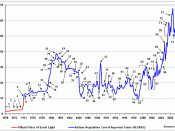OPEC: The Developed World's Worst Economic and Environmental Enemy The Organization of Petroleum Exporting Countries was founded in 1960. At this time there were five founding members; Iran, Iraq, Kuwait, Saudi Arabia and Venezuela. Six other countries are members to this date and form the current Conference; Qatar joined in 1961, Indonesia in 1962, Socialist Peoples Libyan Arab Jamahiriya in 1962, the United Arab Emirates in 1967, Algeria in 1969 and Nigeria in 1971. Two countries have been members but have since left the Conference. Ecuador joined in 1973 and requested that its membership be suspended in 1992, and Gabon joined in 1975 only to request its membership suspended in 1994. The purpose of OPEC is to co-ordinate oil production policies in an attempt to stabilize the oil market and achieve a reasonable rate of return for oil producers. The OPEC nations supply over 40% of the world's oil, and control over 78% of the crude oil reserves globally.
It seems that the issues that effect the OPEC nations favorably are felt negatively in the Western Hemisphere, and vise versa. Price increases that OPEC strives to achieve hurt the economy of the developed world. Oil market gluts that hurt the OPEC economy result in lower fuel costs in the Western Hemisphere. The Western "dependency"� on OPEC oil hurts the global environment.
Throughout history OPEC has maintained its policies while the developed world panicked and protested. The current relationship between OPEC and the developed world is negatively affecting the global economy and environment.
The first wave of panic started as the Arab-Israeli war stopped flow of oil to the west in 1973. The panic sent automobile owners to the pumps in droves. The result "" a limited supply of fuel, and an extreme demand for it caused the pumps to...


